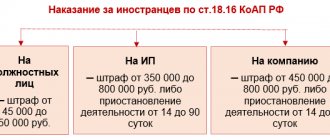27.08.2019
0
1446
5 minutes.
In a business environment, communication is very important, since the effectiveness and efficiency of all parts depends on its quality. The rules of interaction between superiors and subordinates, as well as within the team, are called subordination. It is based on respect for management, adherence to business etiquette and performing one's work tasks without conflicts.
Features of service relationships
There is no clear list of distinctive features of a working relationship, but we will try to highlight a few:
- hierarchy - each organization has an established vertical of power, documented in the job description, collective agreement, labor agreement. Here you will find out what rules are used to draw up the job description of the general director of an LLC;
- ethics – the legislation does not establish a clear line of behavior for employees and management. Norms of behavior and business communication are formed under the influence of ethical and moral principles and education;
- sanctions - non-compliance or non-compliance with generally accepted standards of behavior entails financial penalties, verbal reprimands, demotions, and dismissal. How to correctly draw up a disciplinary sanction order - read the publication at the link;
- improvisation – in our country there are no high-quality educational institutions that would teach corporate etiquette and the rules of business communication.
Regulation of official etiquette
If company management neglects to develop rules, this is fraught with chaos and confusion in the work process. Each employee should know who will help him, whose requirements he must fulfill, how much work his subordinate is ready to handle.
Large organizational structures build structural diagrams where the hierarchy between divisions and departments is clearly visible.
As mentioned above, the rules and norms of behavior are determined by: orders, the charter of the enterprise, labor and collective agreements, job descriptions. The rules for drawing up and executing a job description for a chief accountant are discussed here.
There is no legislative regulation of relationships, but Article 192 of the Labor Code of the Russian Federation lists the main types of disciplinary sanctions.
Labor Code of the Russian Federation Article 192. Disciplinary sanctions
For committing a disciplinary offense, that is, failure or improper performance by an employee through his fault of the labor duties assigned to him, the employer has the right to apply the following disciplinary sanctions: 1) reprimand; 2) reprimand; 3) dismissal for appropriate reasons. Federal laws, charters and regulations on discipline (part five of Article 189 of this Code) may also provide for other disciplinary sanctions for certain categories of employees. Disciplinary sanctions, in particular, include the dismissal of an employee on the grounds provided for in paragraphs 5, 6, 9 or 10 of part one of Article 81, paragraph 1 of Article 336 or Article 348.11 of this Code, as well as paragraph 7, 7.1 or 8 of part one of Article 81 of this Code Code in cases where guilty actions giving grounds for loss of confidence, or, accordingly, an immoral offense were committed by an employee at the place of work and in connection with the performance of his job duties. The application of disciplinary sanctions not provided for by federal laws, charters and regulations on discipline is not permitted. When imposing a disciplinary sanction, the severity of the offense committed and the circumstances under which it was committed must be taken into account.
Inner order rules
Recommendations to help you save your job:
- Do not make sarcastic and rude remarks directed towards a superior. If you have a constructive suggestion, express it politely.
- Closedness and reticence are the main vices when communicating with superiors. Try to show more interest in the conversation, do not answer in monosyllables.
- Address your superiors carefully, as your immediate supervisor will take this as a sign of disrespect on your part.
- If the team is given a task, but responsibilities are not assigned, do it yourself. Such a solution will increase efficiency and eliminate discrimination in labor activities.
- Don't make empty promises that you can't keep. Soberly assess your chances of success.
- Don't use your colleagues as a tool for self-realization.
- Try to take the initiative when solving non-standard problems, do not hesitate to express your opinion. Be a support for your superiors and other employees of the company.
Read more: There is no decoding of the signature in the work completion certificate
Key principles of subordination.
Consequences of non-compliance and violation of labor discipline
Isolated cases of insubordination lead to verbal reprimand from senior management. After the debriefing, the boss closely monitors the offender.
The extreme penalty is dismissal. Management meets the offender halfway and offers to write a letter of resignation of his own free will. However, extreme dissatisfaction leads to unilateral termination of the employment contract. The note is entered in the work book.
Comment
- Systematic refusal to perform work , which previously resulted in a reprimand or reprimand (based on clause 5, part 1, article 81 of the Labor Code).
- Committing a serious violation of the employment contract under clause 6, part 1, art. 81 TK.
- Making a decision that led to property losses for the company , if the employee performed management functions in the company, was a deputy manager or chief accountant under clause 9, part 1, art. 81 TK.
- Committing a gross offense under clause 10, part 1, art. 81 Labor Code (this is, for example, absenteeism or showing up at work drunk).
- Loss of trust (in the case of an employee working with material assets) according to paragraphs. 7 hours 1 tbsp. 81 TK.
- Committing an immoral offense by a teacher under clause 8, part 1, art. 81 or a gross violation of the charter of an educational institution under paragraph 1 of Art. 336 TK.
- Violation of anti-doping rules by athletes under Art. 348.11 TK.
Dismissal
Dismissal is the last and most severe sanction for an employee. It is applied in case of systematic violation of labor discipline by an employee (if, having an outstanding disciplinary sanction, the employee committed it again within a year), as well as in case of a gross disciplinary offense.
We recommend reading: How much and what do they give in the dairy kitchen during pregnancy?
When a reprimand is issued, an internal order is drawn up and entered into the employee’s personal file. There are severe reprimands
, which are issued for more serious violations and may be subject to material penalties and fines for the employee, if this is provided for by the company’s internal regulations.
- conscientiously fulfill his labor duties assigned to him by the employment contract;
- comply with internal labor regulations;
- observe labor discipline;
- comply with established labor standards;
- comply with labor protection and occupational safety requirements;
- treat with care the property of the employer (including the property of third parties owned by the employer, if the employer is responsible for the safety of this property) and other employees;
- immediately inform the employer or immediate supervisor about the occurrence of a situation that poses a threat to the life and health of people, the safety of the employer’s property (including the property of third parties located at the employer, if the employer is responsible for the safety of this property).”
Rules of subordination at work, what constitutes non-compliance in business relations and what the consequences are
A reprimand may result, for example, from failure to fulfill his official duties by the warehouse manager V.V. Petrov, which resulted in financial losses for the enterprise in the form of failure to sign an agreement with suppliers. The employee may be given a regular or severe reprimand
(at the discretion of the employer).
The inability to set priorities also refers to manifestations of broken subordination at work. The performer’s task is to clearly understand what of the planned needs to be completed immediately, and what can be postponed for the coming days.
What are the most common mistakes that can be cited as typical examples of violation of the principles of subordination? One of them, the most common, is the submission of orders to a subordinate by superior management, bypassing the person who is the latter’s immediate superior. For example, the shop manager tries to give instructions to the workers, bypassing the foreman or foreman. Thus, the authority of the head of the department can be significantly reduced, and employees cease to take him seriously.
Types of subordination
The Western system of corporate subordination is softer and involves decision-making not only by a superior person, but also by ordinary employees of the department. People in these countries believe that the success of a corporation depends on the success of every person working in it.
When criticizing an employee or subordinate, it is important to maintain the desire to improve the work of both him personally and the entire organization. Attempts to discuss behavior should not be intended to humiliate or demonstrate power.
Types of subordination
Depending on the object under consideration, it is customary to distinguish between two variations of service relations.
Vertical hierarchical chain
In the organizational structure, this is the relationship between the boss and subordinates, employees and the manager.
A few rules that will prevent passions from heating up in the team:
- If the employee does not complete the assigned task, remind him of the consequences of such shirking. By going with the flow, you indulge the slackness of the organization's staff;
- It is better to make comments to an employee face to face, this way you will save his face in the eyes of the team. Do not get personal or insult;
- do not panic in difficult situations, the leader always remains with a cool head;
- do not discuss in public with your superiors;
- if your boss consults with you, try to show your knowledge and creative thinking;
- It is better to contact your manager with questions, rather than a superior person. This can humiliate your boss.
Horizontal relationships
Here relationships between employees and department heads are formed. It is more acceptable to follow the ideals of democracy and partnership. A few rules that will make the corporate atmosphere friendly:
- divide responsibilities equally if the manager has not appointed specific performers;
- refrain from fighting for clients, they can always be found, but relationships with colleagues will deteriorate irrevocably;
- Discussion of personal life is unacceptable during work activity.
Basics of subordination in business relations.
If you are communicating with a peer leader, pay attention to the following recommendations:
- clearly and concisely present important information, do not demand immediate answers from the interlocutor to the questions posed;
- operate only with facts and figures - this will force your partner to understand the essence of the issue;
- do not engage in confrontation, remain calm, keep your emotions under control;
- initiative in developing a project is good form;
- the use of obscene language is unacceptable;
- To strengthen your acquaintance, exchange business cards with your interlocutor.
Common errors
No one is immune from shortcomings, so it is important to familiarize yourself with the following typical errors:
- The director of the enterprise gives orders to the department, bypassing the immediate superior. This undermines his authority in the eyes of his subordinates.
- Control over the execution of orders is carried out by another person. To avoid misunderstandings and arbitrariness, specify the powers of such a person in advance.
- Assigning two employees to solve one problem. This not only creates competition, but also slows down the work of the organizational structure.
- There is no priority for completing urgent tasks. The employee must understand what is most important now.
- Personal insult is a terrible sin for a leader. Trying to stimulate a subordinate, the boss not only aggravates the situation, but also asserts himself at the expense of another.
System of relationships according to subordination
If you follow the rules of subordination, interaction in all areas of activity occurs more efficiently. These are three main planes, namely:
- The leader is the performer.
- The executor is the leader.
- Relationships between partners.
Read more: How to add to the agreement that it is possible to use the UPD
In many organizations, the authority of the leader is very high. It follows from this that in a team it depends on the boss how well each employee understands the norms of behavior, taking into account subordination. This means that labor discipline is maintained within the proper framework, and employees do not confuse orders with requests or recommendations.
Basic rules of interaction between company representatives
The norms of subordination depend on the type of hierarchy:
- Vertical. Assumes that the higher level gives instructions to the lower one. For example, a manager gives tasks to his subordinate. The latter is obliged to fulfill them.
- Horizontal. Involves interaction between employees of equal status.
Relationships that involve submission are traditionally considered difficult. Hidden conflicts often arise between the manager and subordinates, which complicate work. Subordination helps prevent problems. Its features depend on what kind of relationships are regulated.
How relationships are built
Maintaining order like the army is easier than gaining authority among subordinates. But there are several rules that make a leader successful:
- If the boss appreciates the work of employees, he does not skimp on praise and adequate monetary reward.
- The ability to take full responsibility for running a business at a critical moment.
- The desire to fairly distribute work among subordinates.
- Instructions are given without raising one's voice, but also without entering into familiar relations.
- The key principle is money only for work completed.
- Orders are allowed only in exceptional cases or if the employee does not fulfill his obligations.
How is subordination regulated?
The main documents, from the point of view of jurisdiction, are the organization’s charter and job descriptions. When starting a job, a contract is signed outlining responsibilities and rights in writing, although ethical standards of behavior are critical. Refusal to do so is considered a violation of labor discipline.
Subordinates must behave correctly and tactfully with their superiors in order to maintain a positive attitude in the team. Their further career growth directly depends on the behavior of employees. Therefore, a categorical tone, attempts to “bypass” the manager and appeal to higher authorities are not allowed. This may be considered an administrative violation.
No organization can exist without a clearly structured horizontal and vertical chain of command. Violation entails disciplinary liability: both individual and general. In this case, punishment in the form of a penalty is applied to the entire workforce.
Article 192 of the Labor Code of the Russian Federation considers the types of disciplinary sanctions. Failure to comply with subordination at work entails consequences in the form of the following penalties:
- Comment.
- Rebuke.
- Dismissal on grounds of moral turpitude.
A single violation of subordination causes a remark, after which the manager more carefully checks the quality of the employee’s performance of his duties. Reprimands are issued both orally and recorded in a personal file. Disciplinary offenses, both isolated and persistent, become the cause of reprimands.
An extreme measure, dismissal, is allowed in case of a gross one-time violation of subordination, potentially falling under an article of administrative or criminal violation (for example, beating a manager), or due to regular violations that negatively affect the situation in the team.
A friendly atmosphere in a team contributes to business advancement, so maintaining subordination is nothing more than a reasonable measure to achieve a common goal.
Insubordination is a fairly common phenomenon that can be encountered when applying for a job. It can manifest itself in a variety of ways. Therefore, it is worth taking this into account and knowing how to stop such practices in relation to yourself.
Subordinate - leader
Dismissal is the most extreme measure for failure to comply with subordination. Usually it is proposed to write a dismissal of your own free will, but if you greatly upset your superiors, you may be dismissed under an article for systematic violation of labor discipline and failure to fulfill direct duties. Such a mark in the work book can radically affect your future career, or put an end to it.
Between colleagues
- Try to help create a positive atmosphere among the team, because the manager strives to unite the staff and set up teamwork in the company.
- You must express your position and work proposals tactfully and politely; the manager will not tolerate impudent comments in his direction. Use phrases: “Excuse me, “Could we try this option...”.
- maintaining distance even with employees occupying positions of the same level;
- there is a risk of employees using each other for personal gain, which often happens when their relationship becomes friendly.
We recommend reading: If You Take Placentobiopsy, The Result Is Positive For Chromosome 21, Doctors May Make a Mistake
How should subordination be manifested?
If we consider the basic rules on which business relationships are built, then several points can be attributed to these. Moreover, in different planes they have different manifestations. So, for example, in the “boss-employee” relationship, the following are distinguished:
- Refusal of familiarity, which may ultimately interfere with giving orders and criticizing (within the limits of what is permissible, of course) the work of a subordinate.
- A correct attitude is observed first of all in the fact that in a relationship there should be no negatively manifested critical remarks in the form of insults, including behind the back of the person being criticized. Any issues are resolved legally. The bosses themselves often suffer from this point.
- Politeness is the basis of any business relationship. This is not to say that you should be completely bowed down, but proper etiquette is the basis for successful relationships in the work environment between all parties.
- Maintaining hierarchy requires addressing the leader, not his superiors. Otherwise, such steps of the manager may offend. The exceptions are those situations when the leader is truly a tyrant and it is impossible to come to an agreement with him under any circumstances.
- The absence of insults is the basis on which any disputes between the parties will be resolved in the most correct manner. If we are talking about insults on political, gender or other grounds, then we can already talk about discrimination.
Read more: Should a director have a job description?
At the same time, the boss should understand that initially the rules of the relationship and their tone are set by him. But between bosses or partners, subordination is built not only on the above principles, but also on the following rules:
- Lack of subjectivity, that is, personal views on the subject of the dispute are not relevant to the business world. Here you need to rely on facts.
- Correct attitude requires polite attitude on any level, even between superiors at different levels. Criticism in front of subordinates is especially prohibited, otherwise the authority of the leader is undermined.
- Save time. Conversations should be conducted in a businesslike manner. This will create the most productive relationship possible.
A respectful relationship between managers and partners allows us to set a favorable background for the climate in the company. After all, it was precisely because of the violation of subordination in the team that the proverb that “the fish rots from the head” began to be used in the work sphere. Between subordinates, the rules of subordination are less stringent, but the main ones include:
- Lack of gossip, squabbles;
- Warm, but not overly friendly relations in the team are welcome;
- No encroachment on the client base of a colleague;
- No empty promises that the parties are not sure about.
These are the basic rules.
What is it like?
Service relationships can be vertical or horizontal. What is meant? The names speak for themselves. The first (vertical) are top-down (boss - subordinate) and bottom-up (employee - manager) relationships. When talking about them, by default they mean obedience to the orders of senior management.
A real boss who adheres to the rules of corporate culture will never allow familiarity towards those who occupy lower positions. To avoid work troubles, distance must always be maintained, and in a mutual manner. After all, there are situations of inappropriate behavior on the part of employees towards the manager. This may be expressed in banter or inappropriately categorical tone.
Such familiarity backfires on employees. Those who regularly violate the principles of subordination are usually the first candidates for staff reduction. For his part, a leader who delves into the personal problems of his subordinates, is able to share private experiences with them, and forgives optionality and indiscipline, behaves short-sightedly and ultimately loses the authority due to his position.
Responsibility for non-compliance with subordination at work
As mentioned earlier, each company has its own measures to prevent improper actions. They can manifest themselves, according to Art. 192, in the form:
It is worth noting that dismissal requires either a gross violation of the rules, entailing a number of negative consequences for the company and the team, but in case of a one-time dismissal, a remark or reprimand is given. If the case goes towards dismissal, then these actions should be of an exclusively documentary nature. Otherwise, such manifestations may be considered unlawful and in court the decisions of superiors may be overturned in favor of the subordinate with appropriate compensation.
Fundamental Concepts
Subordination is a service code that regulates the relationship between subordinates and superiors, the team.
Some believe that this is slavish adherence to the whims of superiors, to the detriment of constructive proposals. The Labor Code imposes obligations on company managers, so a commercial organization cannot exist without a clear vertical and horizontal chain of command (we'll talk a little later).
Neglect entails individual and general punitive measures: oral/written comments, reprimand, dismissal due to immoral behavior, dismissal of an employee for absenteeism.
How to properly build subordination in a work team - watch this video:










